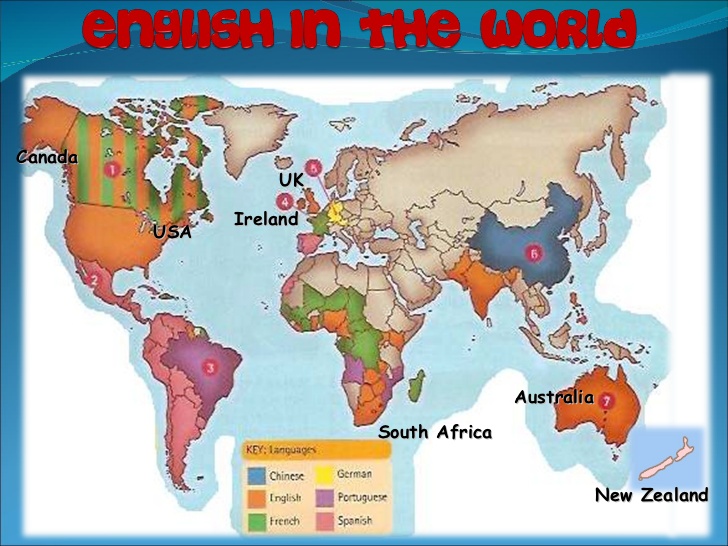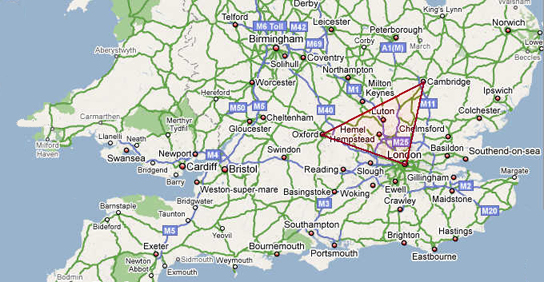リンガフランカ化した英語には、本国のイギリス(ブリティッシュ)英語を含め、9つのメジャーな方言があります。今回は英語方言とイギリス英語の内部事情に関する記事です。
- dialectとaccentの違い
- 英語のメジャー方言(Top Dialects of the English Language)
- アメリカ英語(American English、地域:アメリカ大陸)
- イギリス英語(British English、地域:ヨーロッパ)
- ロンドンを中心に見たイギリス英語の主要方言
- アメリカ英語の訛
- カナダ英語(Canadian English、地域:アメリカ大陸)
- オーストラリア英語(Australian English、地域:オセアニア)
- ニュージーランド英語(New Zealand English、地域:オセアニア)
- 南アフリカ英語(South African English、地域:アフリカ)
- アイルランド英語(Irish English、地域:ヨーロッパ)
- インド英語(Indian English、地域:アジア)
- ナイジェリア英語(Nigerian English、地域:アフリカ)
- dialectとaccentの違い
- 英語のメジャー方言(Top Dialects of the English Language)
- アメリカ英語(American English、地域:アメリカ大陸)
- イギリス英語(British English、地域:ヨーロッパ)
- ロンドンを中心に見たイギリス英語の主要方言
- アメリカ英語の訛
- カナダ英語(Canadian English、地域:アメリカ大陸)
- オーストラリア英語(Australian English、地域:オセアニア)
- ニュージーランド英語(New Zealand English、地域:オセアニア)
- 南アフリカ英語(South African English、地域:アフリカ)
- アイルランド英語(Irish English、地域:ヨーロッパ)
- インド英語(Indian English、地域:アジア)
- ナイジェリア英語(Nigerian English、地域:アフリカ)
dialectとaccentの違い
この記事では基本的にdialectは方言と呼び、accentは訛(なまり)と呼んでいますが、日本語で方言と訛の違いはなんでしょう?おそらく訛は主に発音に関する違いが意識され、方言の一部を構成しています。方言は発音の違いに加えて、語彙の違い(同じものでも標準語とは別の呼び方をする、など)や文法の違いを含んでいます。つまり方言>訛の関係が成り立ちます。英語のdialectとaccentも同じ対応関係にあります。これに言語(language)を加えて考えると、language>dialect>accentの関係になっていることがわかります。
したがって以下の引用記事で、英語の本家本元と言えるBritish Englishがdialectのひとつとして挙げられているのはおかしなことではありません。Englishというファミリーの下にAmerican EnglishやIrish EnglishとともにBritish Englishが存在しているわけです。
英語アクセントの特徴
英語の訛(アクセント)として有名なのは、母音の発音に関する違い(短母音と長母音)、RまたはTを発音するかしないかの違いです。Lexicoというオックスフォードプレスが運営するサイトから記事を引用します。
A famous distinction in pronunciation in England is the so-called ‘BATH vowel’, the quality of the ‘a’ sound differing between north and south. For example, someone from Leeds, in the north of England, would typically pronounce ‘bath’ with the short ‘a’ of ‘cat’, whereas someone from Oxford, in the south of England, would typically pronounce ‘bath’ with the long ‘a’ of ‘father’.
BATH母音と呼ばれる発音の区別が有名です。南北でaの発音が違うのです。たとえば、イングランド北部のリーズ出身者は通常、catの場合と同じようにaを短く発音してbath(バス)と言いますが、南部のオックスフォード出身者はfatherの場合と同じようにaを長く発音してbaath(バース)と言います。
Another distinction, still more significant on the world stage, concerns the issue of rhoticity, i.e. whether or not a written ‘r’ is sounded when it follows a vowel, for example in the words ‘car’ and ‘butter’. Whilst most people in England and Wales do not pronounce the ‘r’ (and are therefore non-rhotic), many in South-West England and parts of Lancashire do. In this they are joined by most Scots and Irish speakers of English, and by the majority of North Americans. Rhoticity is in fact numerically and geographically the dominant form in world terms.
イングランドのみならず世界レベルの発音の違いとしてrhoticity(R発音)の問題があります。Rの直前に母音がある場合、Rを発生するかしないかの区別です。たとえば、イングランドとウェールズの大半の人はこの場合、Rを発音しません(これをnon-rhotic、非R発音と言います)。イングランド南西部やランカシャーの住人の一部はRを発音します。スコットランドやアイルランドの英語話者や北米大陸の英語話者も同じくRを発音します。人口的にも面積的にもR発音者が世界的に優勢なのです。
英語のメジャー方言(Top Dialects of the English Language)
テキストには以下の記事を使います。今回は対訳形式ではなくポイントを解説する形式で進めます。
Most of these 700 million English-language learners study one of two dialects: Received Pronunciation of England, or American English of the United States. However, there’s a lot more to English than just Britain and the USA: English has dozens of other major dialects all across the globe. Here’s a run-down of some of the most common ones.
英語学習者は全世界で7億人もいるそうです。その大半が学ぶのは次のどちらかの方言。
- 容認発音と訳されるReceived Pronunciation(RP)、すなわちイングランドの正格とされる標準英語。RPはクイーンズ・イングリッシュとほぼ同義。
- アメリカ英語(American English)。発音、スペル、文法などの面でRPとは異なる。階級社会のない新しい国で発達した言語なので当たり前。
- 日本の学校教育は、政治経済の主要パートナーがアメリカになった戦後も、イギリスのPRに準じた標準英語を教えているが、基本的には妥当な方針。ことばは聞いて話すだけではなく、読んで書くものなので、「正格」ともいえるRPに基礎を置くことは大事。
以下に、メジャーな英語方言のひとつひとつについて簡単に見てみましょう。
様々な使い方をすることばです。元になっているrun downというイディオムは「downの方へrunする⇒減少する、衰える、劣化する、機能しなくなる」といったネガティブな方向へ動くことが基本の意味です。ここから生まれたrun-downは形容詞としても名詞としても使います。いくつか例文を示しますが、最後の例文が、上の文章のrun-downと同じ概略(要点)の意味となります。
◆動詞句として
The Japanese government are reviled for running down the post-war welfare state.(日本政府は戦後の福祉国家をやめようとしていると批判されている。)
The president promised to run down all military operations in the region.(大統領はその地域の軍事展開の規模を縮小すると約束した。)
◆形容詞として
The avalanche victims were all run-down, thin, with no appetite.(雪崩遭難者は一様に元気がなく痩せて、食欲がなかった。)
You cannot leave those run-down buildings in the middle of the city.(街の真ん中に廃墟ビルを放置するなんてありえないだろ。)
◆名詞として
Dominant industrial use of oil battered Yubari by running down coal mining facilities.(石油の工業利用が拡大して炭鉱施設が閉鎖され、夕張は壊滅的な打撃を受けた。)
I was request for a run-down of the company’s financial situation at the conference.(会議の席上で会社の財務状況について概略を説明するよう求められた。)
アメリカ英語(American English、地域:アメリカ大陸)
With a population of over 300 million, the United States is home to more native English speakers than any other country in the world. The pronunciation of American English can be hard for learners as it makes great use of the letter “R”, which is notoriously challenging for speakers of many other languages.
一国として最多の英語話者をもつ国がアメリカ。アメリカ英語はR音を多用するので、外国人にとってはそこが難関。個人的な経験からもこの指摘はもっとも。LとRの区別ができなくて泣かされました。
Those planning on living in the United States or working with American colleagues should be wary of the odd measurements that American English speakers use: weight is not in kilograms, but in pounds; temperature is not in Celsius, but in Fahrenheit; and distance is measured not in meters or kilometers, but in inches, feet, and miles.
なぜか国際基準を無視して、アメリカ英語は昔の度量衡を使い続けています。重さはキログラムではなくポンド、気温は摂氏ではなく華氏、距離はメートルやキロメートルではなくインチ、フィート、マイル。この点も外国人泣かせ。
別ソースの解説

American English tends to be less formal than British English, so you’ll rarely hear “Might I . . .” at the beginning of a question, but you’ll hear “Can I . . .” regularly. Shortening words is very common (math, pro, admin). And American English tends to be action-oriented in word choice—you take a shower in American English, you don’t have one. It’s interesting that American English managed to retain some characteristics of seventeenth-century British English that are now lost in the original language. In words like flask and pass, Americans pronounce the “a” as a short vowel (æ), while Brits pronounce it closer to the sound in “ah.” Americans also still pronounce the “r” in words like start or far. But one of the most important features of American English is its eagerness to adopt words from other languages. Some words, such as “squash,” were borrowed from Native American languages. Others come from immigrants, who brought words like pretzel (German), bagel (Yiddish), waffle (Dutch), and zucchini (Italian). (It works with non-food words, too.)
別の記事ではアメリカ英語の特徴として以下をあげています。
- フォーマルな表現を好まない。”Might I do something?” の代わりに “Can I do something?” という。
- アクション表現を好む。”have” a showerとは言わず、”take” a showerという。
- アメリカ英語には本国では廃れた17世紀の発音が残っている。たとえば、flaskやpassのaを短く発音する(イギリスではahに近い発音をする)。
- 最大の特徴のひとつは旺盛な借用。アメリカ英語には他言語(主に国内の移民経由)からの借用語が多い。たとえば、カボチャ類を意味するsquashはネイティブアメリカンのaskútasquash(ロードアイランドの原住民Narragansettのナラガンセット語)に由来する。他にもドイツ語からpretzelを、イディッシュ語からbagelを、オランダ語からwaffleを、イタリア語からzucchiniを借用(食べ物以外にも多くの借用語がある)。
イギリス英語(British English、地域:ヨーロッパ)
British English is where it all began: the English language as we know it originated in modern-day England. Interestingly though, Received Pronunciation — a prestige dialect that is widely taught to learners across the world — is spoken natively by only about 3% of the British population.
イギリス英語は、現在英語と呼ばれる国語の発祥地。英語学習者が習う発音は容認発音(RP:Received Pronunciation)と呼ばれる上流階級式の発音ですが、イギリスでRPを話す人口は全体のわずか3%しかいないそうです。
つまり、学校では社会の実情に即さない発音を教えていることになりますが、それには無理からぬ事情があります。英語のように方言が多彩な言語では、どこかに「共通の基準」を設けないとコミュニケーションに支障をきたします。お互いが訛り丸出しでしか喋れなければ、不便で仕方ありません。ネイティブは(少なくてもイギリス本国では)日常的にRPを喋らなくても、(彼ら自身で学校で習っているので)RPがどんな発音でどんな語彙を使うのかを知っています。だから自分とは違う訛を話す人(外国人を含む)と話してもPRという標準的な英語発音を介して「通じる」のです。
ロンドンを中心に見たイギリス英語の主要方言
現代のロンドンには主に4つの訛(アクセント)が混在しています。
- RP(≒Queen’s English)・・・上流階級のことば。典型的にはパブリックスクール(私立学校)⇒ケンブリッジ大またはオックスフォード大のエリートコースを歩んだエリートのアクセント(訛)。poshと言えば、RPを話す上流階級ぽいという意味(例:”Hey, don’t speak like that. You sound posh.”)。Queen’s Englishは女王その人の、つまり王室の発音なので、厳密な意味ではPRと異なる。現代のイギリスは市民階級がメジャー勢力となり移民などの流入者も増えたため、ことばも変化し、RP式に話す人は稀。しかしRPは「標準的な発音」であることに変わりない。
- コックニー(Cockney)・・・ロンドンの労働者階級の訛。上流階級からは「汚い」英語、「品がない」英語と見なされてきた。現代ではコックニーそのものの話者は減り、エスチュアリ―やMLEなど新しいアクセントが主流になっている。
- エスチュアリ―(河口域英語とも、Estuary)・・・RPにもコックニーにも馴染まない中間層が新たに生み出した訛。市民社会の成長に伴って発生したコックニーの「異化形態」。esturaryとは三角江のこと。この場合はロンドンから海に至るテムズ川河口域のこと。ある学者の定義によれば、標準英語の南東イングランド方言(ロンドン、ケント、北サリー、南エセックスなど)。
- MLE(グローバル化が生んだ新しい訛)・・・現代のイギリスは昔のようなはっきりした階級社会ではなくなっています。とくにロンドンでは若者を中心にMulticultural London English(MLE)と呼ばれる第四の方言が主流になっています。様々な階級と出身地(イギリス内外)の人々が交わった結果、RPもコックニーもエスチュアリ―も、アフリカ系移民やアジア系移民のアクセントに影響され、独特のMLEが生まれました。

イギリス英語の訛の区別についての参考動画
参考動画:poshな話し方
MLEに関する参考動画
アメリカ英語の訛
アメリカ英語の場合、RPのような「正統」は存在しませんが、それでも多くの地域方言(regional dialects)が存在します。たとえば、東北部のNew Englandと呼ばれる地方は最も早く白人の入植が進んだ地域で、アメリカ英語発祥の地と言えます。しかし本当は、ヴァージニア州への入植の方がマサチューセッツより早かったのです。ヴァージニアでタバコや綿花が栽培されるようになると、安価な(あるいは無賃の)労働力として、カリブ海や南米から黒人奴隷が大量に連れて来られました。そこで生まれたのが南部方言です。
これらはすべて東海岸の話ですが、入植は西へ向けて進み、中西部方言(シカゴ、ミネソタなど)、西部方言(カリフォルニア、オレゴンなど)、海を渡ってハワイ方言が発生していきました。また様々なバックグラウンドの人間が交わる大都市は独特の訛(アクセント)を生みやすく、ボストン、ニューヨーク、シカゴ、サンフランシスコなどのアクセントが著名とされています。
ブログ主は西海岸のシアトルに留学していたのですが、ニューヨークへ旅行したとき、ホテルのフロントで “Can I use your pen?” とペンを借りようとすると、ちょっとバカにしたような顔をされ、”Are you from the West Coast? You sounds Californians. We’s rather say, ‘May I borrow your pen?’ in this case.” と指摘されました。あるいは “(Would you)Mind if I use your pen?” と言え、と。余計なおせっかいなのですが、アメリカでお国訛りを意識するようになった瞬間でした。
British English is more lenient with the letter “R” than American English; it’s only pronounced if it’s followed by a vowel (e.g., in the word “mural”) or if it’s at the beginning of a word (e.g., “royal”). It also differentiates itself from American English in terms of spelling.
Words that end in “or” in American English have an extra “U” in British English (e.g., colour, flavour). And words that end in “ize” are spelled with an “s” (e.g., realise, organise).
R音に関してイギリス英語はアメリカ英語よりも「ゆるい」傾向を持ちます。Rは発音されないことが多く、発音されるのは、Rの次に母音が来る場合(たとえば、mural)、Rで始まる単語の場合(たとえば、royal)のみです。
スペルに関しても英米の違いは大きく、アメリカ英語でorで終わる単語は、イギリス英語ではourで終わります(例えば、color⇒colour、flavor⇒flavour)。アメリカ英語でizeで終わる単語はイギリス英語ではzではなくsが使われます(たとえば、realize⇒realise、organization⇒organisation)。
カナダ英語(Canadian English、地域:アメリカ大陸)
Canada is unique in that it combines elements of both American and British English. For example, they spell “flavour” and “colour” like the Brits do, but in terms of words like “realize” and “organize”, they side with the Americans.
カナダ英語には英米の折衷という特徴があります。たとえば、カナダ人はflavour、colourにイギリス式に綴りますが、realizeやorganizeの場合はアメリカ式に綴ります。
The best-known feature of Canada’s speech is their uniquely Canadian use of the interjection “Eh!”, which is a versatile word that can be used to indicate agreement, surprise, and a host of other sentiments.
カナダ英語のいちばん有名な特徴は、カナダにしかない間投詞Eh!の多用でしょうか。同意、驚き、その他無数の感情をあらわせる無敵のマジックワードです(とくに文末で、アメリカ英語のrightと同じように、相手の同意を促す要素として使われます)。
オーストラリア英語(Australian English、地域:オセアニア)
G’day, mate! The Australian dialect, spoken by over 20 million Aussies, is instantly recognizable, in part thanks to internationally famous Australian celebrities such as the late Steve Erwin, who popularized it across the globe.
2000万人を超えるオーストラリア英語話者は、世界的な有名な故スティーブ・アーウィンの話し方を通じて瞬時に判別可能なものとなっています。
Perhaps the most curious feature of Australian English is their tendency to shorten words, such as “brekkie” for breakfast and “barbie” for barbecue. In fact, the word “selfie”, which was added to the Oxford English Dictionary in 2014, originated in Australia.
オーストラリア英語の興味深い特徴はことばの短縮かもしれません。オーストラリア人は breakfast を “brekkie”、barbecue を “barbie” と言います。2014年にオックスフォード英語辞典に追加された “selfie” もオーストラリア産なのです。
ニュージーランド英語(New Zealand English、地域:オセアニア)
The New Zealand accent may sound exactly like Australian English to an untrained ear, but there are a few key differences, one which has to do with the pronunciation of the letter “I” in words like “bit” and “sit”. Whereas these words in Australian English sound more like “beat” and “seat”, in New Zealand, they’re closer to “but” and “sut”. This small difference can help you tell apart English speakers from Australia and New Zealand.
ニュージーランドのアクセントは、英語に慣れていない耳にはオーストラリア英語と同じに聞こえますが、決定的に違う点があります。たとえば、bitやsitのような単語のIの発音です。オーストラリア人の発音はbeat、seatのように聞こえますが、ニュージーランド人の発音はbut、sutのように響きます。わずかな違いかもしれませんが、両者を区別するのに役立ちます。
余談ですが、オーストラリア英語はAussie accent、ニュージーランド英語はkiwi accentと呼ぶことがあります。
南アフリカ英語(South African English、地域:アフリカ)
Though it’s not the top language in South Africa, there’s quite a large population of English speakers in the country, especially in urban areas like Cape Town. South Africans have applied their own meaning to certain English phrases, especially those involving time. Confusingly, “just now” and “now now” do not mean “immediately”, but instead are closer to “in a little while”. If you want to convey a sense of immediacy, use “right now”.
南アフリカでは英語は話者数No.1の言語ではありませんが、ケープタウンのような大都市部には多くの英語話者がいます。南アフリカ人は英語のフレーズ、特に時間表現に彼ら独自の意味を付加しています。紛らわしいのですがjust now、now nowという表現は「今すぐ」ではなく「もうすぐ」(in a little while)の意味になります。南アフリカで「今すぐ」と言いたいときはright nowを使いましょう。
アイルランド英語(Irish English、地域:ヨーロッパ)
The dialect of Ireland is known for its old-timey charm, and often appears in pop culture. To sound like the Irish, start by turning your “Ds” into “Js” when they come at the beginning of a word — so “duty” is pronounced like “juty”. And non-native speakers will be glad to know that the Irish often forgo the “TH” sound altogether, instead replacing it with more easily pronounced alternatives like “T” or “D”.
アイルランド英語はその昔懐かしい響きが魅力で、ポップカルチャーにも頻繁に登場します。アイルランド英語ぽく発音したいときは、単語の先頭のDはJと発音しましょう。たとえば、”duty” は「デューティ」ではなく「ジューティ」と発音します。ノンネイティブに朗報だと思いますが、アイルランド人は頻繁にTHを発音しません。代わりにTやDのように発音しやすい音に置き換えるのです。
インド英語(Indian English、地域:アジア)
Another dialect that seldom pronounces the “TH” sound is the English spoken in India. There are a whopping 120 million English speakers in India; however, only a handful of them speak English as a first language. Given that only one of India’s numerous native languages contains the “TH” sound, most English speakers in India do not pronounce it. Like the Irish, the replace it with a “T” or “D”.
話者数1億2000万人を擁するインド英語(Hindu English、Hinglishとも)ですが、第一言語として英語を話す人口はほんの一握りです。インド人も滅多なことではTHを発音しません。インドの数多あるネイティブ言語のうちTHの音をもつのはたったひとつの言語だけなので、むべなるかな。インドの場合もアイルランド同様、THはTまたはDと発音します。
Indian English also uses the original Indian counting system for large numbers, employing words like “lakh”, which refers to 100,000. This might seem peculiar to those unfamiliar with the system, though it’s certainly no stranger than the measurements used in American English!
インド英語では10万以上の巨大数の単位に、lakh(ラーク、10万の意)など自前の命数法の単位を用います。不慣れな人には奇妙な習慣に映るかもしれませんが、アメリカ英語の我が道を行く計測単位に比べれば、常識的な対応と言えます。
Hindu Englishの特徴を解説した動画
<記事引用終わり>
ナイジェリア英語(Nigerian English、地域:アフリカ)
9つ目の方言のナイジェリア英語はメインソースの記事には挙げられていませんので、アメリカ英語の解説でも使わせてもらった別記事から解説を引用しましょう。

Roughly half of Nigeria’s population, some 83 million people, speaks English as well as a native language. In fact, English is the official language of Nigeria. But Nigeria also has many widely spoken native languages, which exert a noticeable influence on Nigerian English. For example, articles are not a feature of the native languages of Nigeria, so Nigerian English often omits “a” and “the.” You “eat apple” or “take nap” in Nigerian English. Another quirk is that every class of word can be turned into a verb. So, for example, you “off the TV” in Nigerian English, instead of turning it off. An interesting characteristic of Nigerian English is that words are generally pronounced as they are written. Many languages around the world are spelled phonetically, but English isn’t one of them. In Nigerian English, though, you would pronounce the “t” in “listen” or “often.”
ナイジェリア人口の約半分8,300万人が英語話者と言われます。英語はこの国の公用語でもあります。ナイジェリア英語は現地にたくさんある話し言葉の影響を受け、冠詞のaやtheを省く傾向にあります。たとえば、ナイジェリア英語では、eat apple、take napと言います。また、あらゆる品詞を動詞にする点が際立った特徴と言えます。たとえば、「テレビを消す」はturn off the TVではなく、off the TVとoffを動詞として使います。英語はスペルと発音が必ずしも一致しない言語ですが、ナイジェリア英語では書いた通りに発音します。たとえば、ナイジェリア人はlistenやoftenに含まれる無声のtを、t音として発音します。
ノリウッド映画 “Gone Too Far”(2013)
ナイジェリアではインドのボリウッド(Bollywood)と並んで、映画作りが盛んです。とうとうノリウッド(Nollywood)というあだ名がつくほどの破竹の勢いです。下の映画はロンドン移民一家の悲喜劇を描いた作品で、根底には重いディアスポラの問題が横たわっています。ナイジェリア英語満載ですので、どのような英語が知るにはうってつけの題材になっていると思います。







コメント